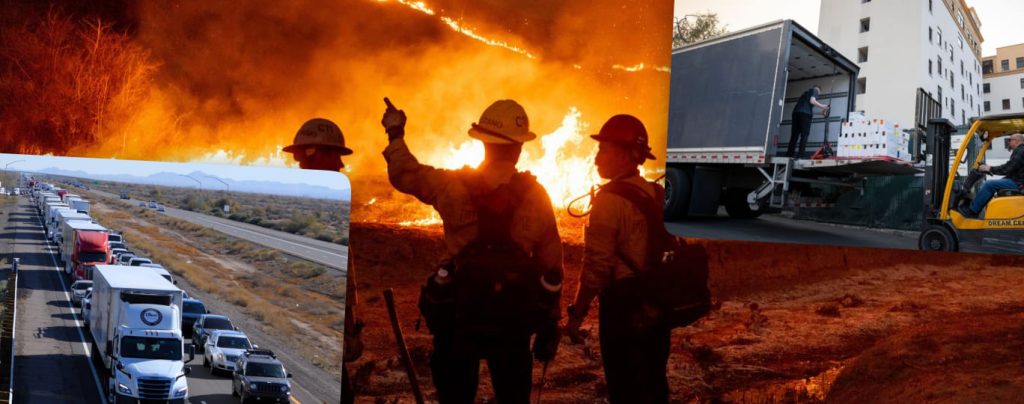How Trucking Is Helping LA Through Wildfires

This month, devastating wildfires swept through Los Angeles, causing massive destruction and disruption. Entire neighborhoods were destroyed, highways were closed, and tens of thousands of people were forced to evacuate. The fires also impacted trucking operations and other activities across the region.
As of Friday, the fires had tragically claimed 10 lives and destroyed approximately 9,000 structures. Driven by strong Santa Ana winds, five major wildfires overwhelmed local resources and communities.
Before the fires began, the California Trucking Association (CTA) had already issued warnings about the risks of high winds, particularly for truck rollovers. As the fires spread, the CTA intensified its efforts by providing frequent updates on road closures and other critical information in partnership with the California Office of Emergency Services. Unfortunately, the devastation reached some of its members, with reports of significant personal losses, including homes. In response, the CTA has started collecting donations to assist with recovery efforts.
How Trucking Was Affected
The fires created significant challenges for trucking operations. Smoke from the wildfires reduced air quality and visibility, spreading as far as San Pedro Bay. While the Ports of Los Angeles and Long Beach remained operational, trucking activities in the surrounding areas faced disruptions. High winds caused trucks to overturn, and the mass evacuation of over 100,000 people resulted in severe traffic congestion, particularly on major routes like Interstate 5.
Despite these challenges, members of the trucking industry came together to provide support. Companies worked to deliver supplies and resources to displaced families, showcasing the industry’s ability to mobilize quickly and help during a crisis.
Coordinated Relief Efforts
The American Logistics Aid Network (ALAN), a nonprofit formed after Hurricane Katrina, has played a key role in coordinating the trucking industry’s disaster relief efforts. The organization has worked closely with local nonprofits to identify their needs and connect them with donations.
In addition to immediate relief, ALAN has been guiding the industry on how to plan for long-term recovery. By assessing current and future needs, the organization is helping ensure that the relief efforts are effective and sustainable, providing much-needed support to communities affected by the fires.
Trucking’s Role in Recovery
The trucking industry has proven to be a vital part of the recovery process, offering resources, logistical support, and real-time updates to help mitigate the effects of the wildfires. From delivering essential supplies to maintaining clear communication during the crisis, the industry has shown its resilience and commitment to supporting communities in need.
As Los Angeles begins the difficult journey of recovery, the trucking industry will continue to play an essential role in rebuilding and restoring stability to the region.